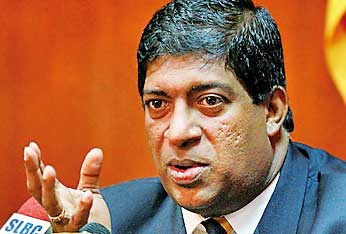Monday Feb 23, 2026
Monday Feb 23, 2026
Wednesday, 1 June 2016 00:10 - - {{hitsCtrl.values.hits}}
 Reuters: Japan will lend $4.2 billion to Sri Lanka through both a loan and bond financing for budgetary support in the next two years, including infrastructure development, the Finance Minister said on Tuesday.
Reuters: Japan will lend $4.2 billion to Sri Lanka through both a loan and bond financing for budgetary support in the next two years, including infrastructure development, the Finance Minister said on Tuesday.
The borrowing comes as Sri Lanka seeks to resolve its precarious balance of payments position after a sharp depletion of foreign exchange reserves – a legacy of massive debt piled up under the previous government.
“Japan has committed $2.9 billion at a low interest rate of 0.01 percent over the next two years, and it’s up to us to utilise the full amount,” Minister Ravi Karunanayake told reporters in Colombo, on his return from a G7 meeting in Japan. He said the repayment period for the $2.9 billion loan would be 40 years, adding that a $1.3 billion bond would also be issued in Japan.
On 19 May, Karunanayake had said the total borrowing cost of Japanese funds would be 3.5% to 4% “with the exchange fluctuation risks and dollar swap”.
Sri Lanka is heavily indebted, partly due to borrowing by the previous Government during its nine-year tenure that ended in January 2015. It faces a balance of payments crisis, with around $2 billion in foreign outflows from the government securities market since October 2014.
Karunanayake in the past has said the Government will repay short-term expensive loans with cheaper long-term loans.
The Government delayed its 2016 borrowing plan until it reached a deal with the International Monetary Fund (IMF) last month for a $1.5-billion bailout to help the $82.2-billion economy avert a balance of payments crisis.
Japan disbursed $2.69 billion to Sri Lanka between January 2006 and September 2014, Treasury data showed, putting it second only to China as a sovereign lender.
Sri Lanka has taken steps to ease the pressure on foreign debt repayment, such as a request that China swap some of the $8 billion it owes to Beijing for equity in infrastructure projects and an offer to sell stakes in its companies to Chinese firms.
It also plans to reform loss-making State-Owned Enterprises while raising taxes to boost Government revenue, after repeated IMF requests.
Reuters : Sri Lanka’s May consumer prices and core annual inflation rose to multi-month highs, data from the state-run Department of Census and Statistics showed on Tuesday after the government increased value added tax to crimp a soaring deficit.
Sri Lanka’s consumer prices rose to a 25-month high of 4.8% in May from a year earlier, accelerating from the previous month’s 3.1% year-on-year rise.
The core annual inflation, which excludes fresh food, energy, transport, rice and coconuts, rose to a 38-month high of 6.6%, from the previous month’s 4.5%.
The government, facing a revenue shortfall and ballooning budget deficit, raised value added tax (VAT) to 15% from 11% with effect from 2 May.
However, the Central Bank said in its monetary policy announcement the increase in the VAT rate and the removal of certain exemptions from VAT and the Nation Building Tax were only expected to have a one-off impact on inflation.
It also said the supply side disruptions due to adverse weather conditions could exert some upward pressure on inflation in the immediate future.
“The rise in both headline and core inflation was expected in May, given the upward tax revisions and impact particularly on non-food items,” said Shiran Fernando, an analyst at Colombo-based Frontier Research.
“Pressure will be there. If the inflation goes beyond the Central Bank’s expected level, it will be a concern.”
The Central Bank nonetheless expects inflation to remain in mid single digit levels supported by appropriate demand management policies.
The Central Bank has kept the key policy rates steady - with standing deposit facility (SDF) rate and the standing lending facility rate (SLFR) at 6.50% and 8.00%, respectively - for three straight months amid private sector credit growth that has been rising despite previous tightening measures.
Higher private sector credit growth, which expanded at a near four-year high of 27.7% in March year-on-year, has raised concerns over demand-driven inflationary pressure.